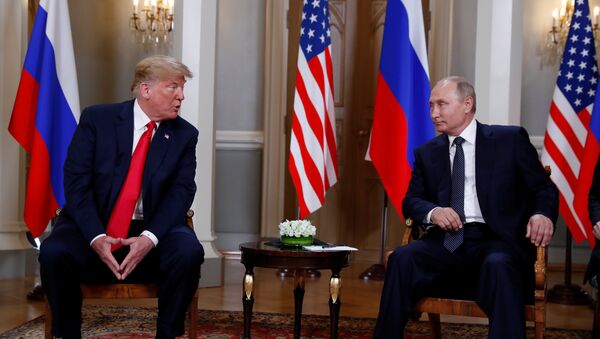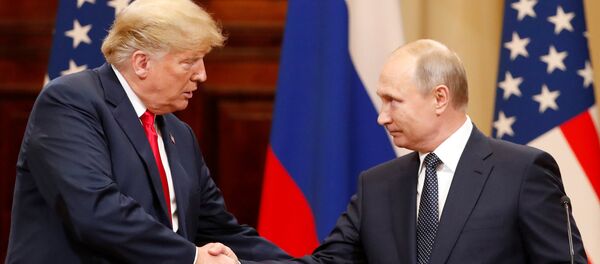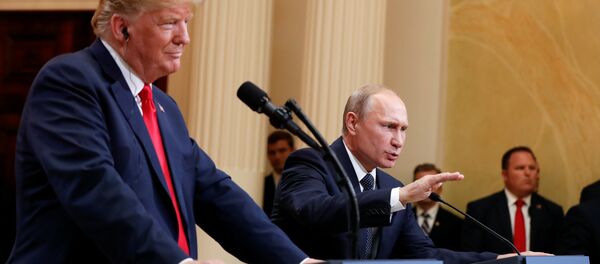The anti-Trump smear campaign sees no signs of abating after the July 16 Helsinki summit between the American president and his Russian counterpart Vladimir Putin. US political observers and media pundits continue to speculate about the alleged Trump-Putin "bromance" and ask whether Moscow "has something" on Donald Trump.
According to Vladimir Golstein, associate professor of Slavic Studies at Rhode Island-based Brown University, the anti-Trump campaign is double-edged.
"The smear campaign against Trump has a double agenda," the professor told Sputnik. "To make Trump follow the policies formulated by such think tanks, as the Council on Foreign Relations (CFR) or the Atlantic Council, and their clients at State Department and various foreign policy and national security agencies. And in case of Trump's deviation from these policies caused by his insistence of following his own plan of actions (whatever it is), to use these smear campaigns as the means of unseating him and his party politically."
Thus, in his op-ed for the Valdai Discussion Club website former US ambassador to Ukraine and senior fellow at the Brookings Institution, Steven Pifer insisted that the US president should "listen carefully to his advisors, avoid going with his (often wrong) gut instincts" when it comes to US-Russian relations. Otherwise, a second Trump-Putin meeting would bring no good for bilateral relations, the former diplomat claimed.
Trump is Not Part of "Washington Consensus"
However, according to Professor Golstein it's not about Trump's lack of skill or experience: The truth of the matter is that the US president is not part of the so-called "Washington Consensus."
"The Washington Consensus wants policy as usual, the one they formulated after the Soviet collapse: the US plays the dominant role in a world that is moving toward corporate globalist economy and neo-liberal political order," the US academic explained. "Russia and other possible geopolitical rivals should be talked to from the position of strength, they have to accept the US hegemony in all parts of the world, and any attempt to deviate from this line will be met by the overwhelming demonstration of hard and soft power."
First of all, the US president was subjected to harsh criticism for downplaying the alleged Russian meddling in the 2016 presidential election which resulted in Trump's awkward flip-flopping. Simultaneously, the US MSM blew a gasket over the potential visit of Vladimir Putin to Washington this fall. Eventually, the high-level summit was postponed until 2019.
Putin's decision to invite Trump to Moscow triggered yet another wave of criticism from the anti-Trump camp and was dubbed "a blatant power move" by some American mainstream media.
"US mainstream media is not independent enough to think outside the box and consider anything that Trump says or does in an objective way," Golstein elaborated. "The media is dominated by the pundits and specialists who come from the same institutions that formulate the policies and guidelines of the Washington consensus. So the media is not going to criticize and question the validity or wisdom of this consensus."
Golstein believes that the US president sees this Cold War-era strategy as "misguided and myopic."
However, "Trump's pragmatic and realistic desire to find new solutions is viewed as a threat by the foreign policy establishment and they intend to fight to protect their turf, even if that fight would inevitably result in the diminishing role of the United States on the global arena," he highlighted.
Still, whether the US establishment likes it or not times have changed and the old playbook is no longer relevant, according to the professor.
"What is important to realize is that we no longer are going to witness the US foreign policy following the same pattern that it did since the collapse of the Soviet Union… That model does not seem to work any longer. And that by itself is a stunning revelation that continues to send shockwaves all over the world. Like with everything else, Trump wants to negotiate and make deals, including deals with his country's own political establishment. How much he'll succeed remains to be seen," the US academic concluded.
The views and opinions expressed by the contributors do not necessarily reflect those of Sputnik.





